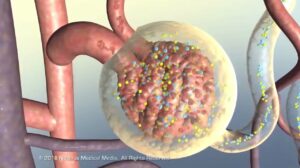NEW YORK (Reuters Health) – In most patients with localized renal cancer, simple enucleation may provide results equivalent to those of standard partial nephrectomy, Italian researchers report in the May issue of the Journal of Urology.
As Dr. Andrea Minervini told Reuters Health by email, “The surgical treatment of renal tumors has moved from maximal tissue and organ destruction to minimal therapeutic tissue removal. This represents an oncological and surgical multidisciplinary development that has previously been witnessed for chemotherapeutic therapies, where medicine moved from the maximum tolerated dosage to the minimum therapeutic dose.”
Dr. Minervini, of the University of Florence, and colleagues note that European Association of Urology guidelines recommend the presence of a minimal surgical margin of healthy renal parenchyma surrounding the resected tumor to reduce the risk of local relapse or progression. The exact thickness of the healthy parenchyma is not specified.
This has led some to employ simple enucleation without including any visible normal renal parenchyma in the removed tissue. There have been questions about the safety of this approach.
To gain more information on outcomes, the researchers retrospectively studied data on 982 patients who underwent standard partial nephrectomy and 537 who had simple enucleation for localized renal cell carcinoma.
After a median of more than 4 years of follow-up, estimated 5-year progression-free survival was 88.9% in the partial nephrectomy group and 91.4% in the enucleation patients — not a significant difference. Corresponding proportions at 10 years were 82.0% and 90.8%.
Cancer-free survival was more than 90% over both of these time periods and again was not significantly different between groups, overall. Nevertheless, while this was true of patients with Fuhrman nuclear grades 1, 2 and 3, the four patients with Fuhrman grade 4 who underwent simple enucleation had significantly worse cancer-free survival.
The researchers conclude that with the exception of this group, “simple enucleation can be regarded as a valid option in the surgical treatment of patients suitable for conservative therapy regardless of the pathological extension of primary tumor.”
Dr. Minervini added, “This is certainly a great step forward, as tumor enucleation could increase the trend to use the conservative approach towards more challenging cases and lower the complication rate, maximizing postoperative kidney function.”
However, the authors point out that the results “need to be reconfirmed in further prospective studies.”
Reference:
Simple Enucleation is Equivalent to Traditional Partial Nephrectomy for Renal Cell Carcinoma: Results of a Nonrandomized, Retrospective, Comparative Study
J Urol 2011;185:1604-1610.




